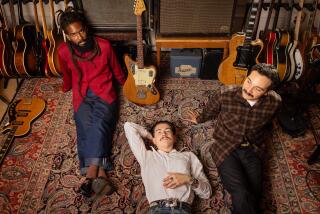POP MUSIC REVIEW : Bee Gees Move Back Toward Soulful Style
Over time, pop music fans learn to be wary of artists who define themselves more by what they aren’t than by what they are.
Case in point: the Bee Gees, who headlined the Universal Amphitheatre on Wednesday and Thursday. The Brothers (“Don’t Blame Us for Disco, Please “) Gibb have spent the better part of the last decade on the run from the white dance-music legacy they left behind.
Never mind that such songs as “Stayin’ Alive” and “Jive Talkin’ ” were among the most memorable in the Bee Gees’ 22-year repertoire of hits and handily came to represent an era.
Said era, the late ‘70s, spelled e-m-b-a-r-r-a-s-s-m-e-n-t for the boys, who subsequently attempted to distance themselves from their unwanted disco-king thrones by removing most of the R&B; from their music--a misguided move if ever there was one.
But if Donny Osmond can have his sins forgiven (or forgotten, more like it) by the teeming masses, then anyone can, and the Bee Gees are on the upswing of what looks like a commercial comeback after a nearly decade-long drought. Is this because of or in spite of their “Saturday Night Fever” heritage? Wednesday’s slick, solid show, their first local appearance since a Dodger Stadium gig 10 years ago, held some clues.
Hesitantly, they’re beginning to put a little soul back into their style. A little. The currently rising single “One” is a mild mid-tempo charmer with a nice, slinky, subtle groove, and stood out as one of Wednesday’s early highlights. It’s likely that its slight but definite R&B; tendencies (lacking on most of the new album of the same name) are what is helping make it such a hit.
Certainly it’s not the content. Lyrically, the album “One” is a veritable stream of meaningless non sequitur cliches. Take a line like “If love is like an ocean, I’ll surely drown” from one song and replace it with a line like “My love is as strong as oceans are far apart” from another, and the switch would hardly make a wave of a difference in the bland wash of either number. But this is not exactly a new setback for the Gibbs.
No, what character there is in the Bee Gees’ canon has been almost entirely vocal. As always, Barry Gibb’s distinctive vibrato ably carried the lead on most of the selections Wednesday, with Robin’s more clear and delicate-sounding tenor a nice second choice. As always, Maurice provided the all-important third harmony voice but sang only a bit of lead. During “Holiday,” he made a cute, self-deprecatory joke out of constantly stepping up to the microphone, only to remember that he has no part at all in that oldie and step back again.
The trio of female backup singers on hand (including the estimable Phyllis St. James) was almost superfluous--and overqualified for the job. Their role was to in some small way bolster the brothers’ already strong harmonies; only in a few instances, as in “How Deep Is Your Love,” could the women clearly be heard on their own.
Vox alone do not legends make, and many memorable tunes were resurrected, largely in a low-key mid-set medley that included such now rarely heard (even on oldies radio) early songs as “Have You Seen My Wife, Mister Jones.”
But though a foot-stomping version of “Lonely Days” came close, the only songs to get most of the crowd enthusiastically on its feet were the closing quartet of funk-and-falsetto disco hits: “Stayin’ Alive,” “Nights on Broadway,” “Jive Talkin’,” “You Should Be Dancing.”
The suspicion was that these were saved for last not because they’re particular favorites of the Gibbs--in fact, their delivery seemed the most perfunctory of anything in the show--but because they’re the most energetic in the repertoire.
This audience was, obviously, a biased one, but the wild reaction to those numbers that the Gibbs seem to find such an albatross should send a message to the brothers: Come back, be black, all is forgiven.
Opening the show with a nod toward the largely fortysomething crowd were the Nylons, a talented yet somehow supremely irritating “rockapella” quartet. The expert nostalgia peddlers’ all-vocal (plus occasional drum machine) versions of ‘60s pop classics fell flat time and time again. Their ability to take a hit like “Up on the Roof” and turn it into a drag of a choral dirge was something remarkable. The a cappella concept promises something organic and rich, but they’re really closer to their namesake product.
More to Read
The biggest entertainment stories
Get our big stories about Hollywood, film, television, music, arts, culture and more right in your inbox as soon as they publish.
You may occasionally receive promotional content from the Los Angeles Times.










